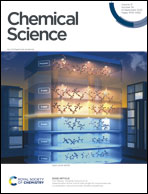Challenges and opportunities for chiral covalent organic frameworks
Abstract
As highly versatile crystalline porous materials, covalent organic frameworks (COFs) have emerged as an ideal platform for developing novel functional materials, attributed to their precise tunability of structure and functionality. Introducing chiral functional units into frameworks produces chiral COFs (CCOFs) with chiral superiorities through chirality conservation and conversion processes. This review summarises recent research progress in CCOFs, including synthetic methods, chiroptical characterisations, and their applications in asymmetric catalysis, chiral separation, and enantioselective recognition and sensing. Challenges and limitations are discussed to uncover future opportunities in CCOF research.

- This article is part of the themed collection: 2022 Chemical Science Perspective & Review Collection


 Please wait while we load your content...
Please wait while we load your content...